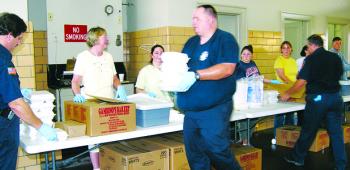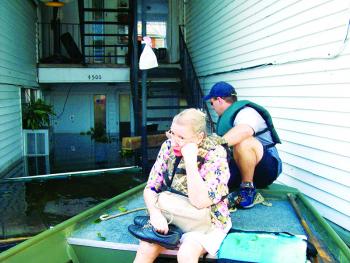
(File photo) The Crowley Fire Department and other community members help prepare plates of jambalaya for the evacuees staying in Crowley at the fire station.

(File photo) Brandon Prudhomme, right, pushes the boat out after rescuing an elderly lady from her second-story apartment in New Orleans.
In the darkest times, a light shone
Sat, 08/29/2015 - 3:20pm
Jeannine LeJeune
Crowley proved to be an integral cog in the post-Katrina wheel
Jeannine LeJeune
Online Editor (Crowley Post-Signal)
CROWLEY –
Moments of coming together have always been the bright spot of national tragedies. Most recently, and locally, it can be seen in “Lafayette Strong” following the shooting last month at The Grand 16 Theatre on Johnson Street.
But, 10 years ago, an entire nation rallied around Louisiana’s beloved New Orleans and Acadia Parish was among those to rally.
B.K. (Before Katrina)
In the days, minutes and seconds leading up to Hurricane Katrina’s landfall, the state was on watchful alert. Locally, however, it was more of a business-as-usual approach.
The projected path of what would become the nation’s deadliest hurricane and be the part of the cementing factor that made the 2005 Atlantic Hurricane Season one for the record books took dead aim at Louisiana and, specifically the Crescent City.
It was a monster, though no one would be able to guess how monumental it would become.
A Crowley Post-Signal story that day focused on the number of homes for sale in the city, a “sign” of the times, if you will. The local prep teams’ performances in football jamborees were reported. Simple, completely average.
What a difference 48 hours made.
“Katrina weary, westward bound” was the story, complete with a ton of photos of exhausted travelers who heeded the final warnings of local, state and national officials to get out of New Orleans and its surrounding areas. One family’s quotes about the ordeal painted the picture that was already unfolding on televisions everywhere:
“We left at noon and that was almost too late. There is no place with openings for us to stay, so we just set up here (at Acadia Parish’s Interstate 10 Rest Area) over the night. It looks like it will be home for a few days,” said Anita Fristol of the Westbank.
“Let’s hope we have a place to go back to. From what we are hearing, New Orleans took quite a hit,” said Anatole Fristol, Anita’s mother.
Crowley lends a hand after Katrina
Words probably still can’t do the situation justice. It was a human tragedy with levees breaching and breaking over and over, until New Orleans was under water.
Local churches began opening their doors for people in need.
“We figured with the traffic backing up we would open up our doors to house as many as we could and feed them,” said Larry Guidry, pastor of The Church of Christ in Crowley.
It was the first of many kind gestures that are still remembered today.
“Ten years ago, after Hurricane Katrina devastated New Orleans, the city of Crowley opened up their hearts and pocketbooks to help those that evacuated,” said Mary Zaunbrecher. “At that time, I was so proud of being part of such a caring community.”
Outside of Crowley’s boundaries, Acadia Parish at large was doing the same.
The Rayne Civic Center would become a shelter for evacuees and the parish quickly began realizing that much more than a little bit of hospitality was going to be needed for New Orleans.
Talk began of opening up the Rice Festival Building as an evacuation shelter, but even after the discussion and the city agreeing to adopt a resolution to make it happen, the item was shelved as the state pushed for shelters to remain in more metropolitan areas.
But, just as the waters calmed, the news grew grimmer in New Orleans.
“Hundreds feared dead” ran in headlines across the world in regards to Katrina. Other headlines included tidbits like “New Orleans chaotic,” painting pictures of blood, violence and death. The picture wasn’t pretty, the outreaching support from Crowley, however, was.
Brandon Prudhomme evacuated to Crowley, his hometown, days before Katrina, wishing his New Orleans home a farewell that he didn’t believe was really goodbye.
Watching the destruction Katrina caused drew him back to New Orleans. He answered a call for help: boaters were being asked to meet at the Acadiana Mall at 4 a.m. Prudhomme along with many others answered the call.
“It was phenomenal,” he would tell The Post-Signal in a 2005 interview. “There were 400 boats there and I walked to some guy and asked if he could use a deck hand. I told him that I was familiar with the area. He said yes and we headed down there.”
Prudhomme hopped onto a boat with Craig Hyde. Upon arriving near New Orleans’ outskirts, they were directed to get people to make noise and get people’s attention and direct them to Metairie Road where airboats would pick up survivors and bring them to another staging area.
“The water got higher and higher and where we parked, we weren’t sure we would be able to get out,” Prudhomme said. “We talked about going check on the trucks, but, every time we would say, ‘One more trip,’ we would find more people and eventually we just forgot about the trucks.”
There was an overflow of letters to the editor for The Post-Signal’s Public Forum, which ran on a Wednesday instead of its typical Sunday.
One especially catches the eye. It was a lengthy letter from Pat Andreponte of Crowley who called on good deeds from area citizens in regards to “the old Bayou Village Nursing Home in Crowley.”
“I entered the front doors, told the staff who I was, and that I was there to hand out hugs. The nurse greeted me, grinned and said, ‘Well honey, there they are (pointing to a room full of evacuees), start huggin’,” wrote Andreponte.
“Those of you living in the Crowley area, go visit the places where evacuees who are not mobile are being housed. Walk among the faces and pick out just one person to ‘take under your wing.’ What a difference you could make in their tragic circumstances. Please do it, for their sakes and yours!” Andreponte concluded.
It was a call to arms for Acadia Parish that residents were already taking to heart before the letter’s publication.
“One distinct memory I have is of the buses from a Slidell nursing home arriving in Crowley,” said Zaunbrecher. “They were brought to a nursing home that had been closed for some time – The Village Apartments on Eastern Avenue.
“Many elderly men and women were brought out of the buses on stretchers and in wheelchairs. There was no food, medicines or nursing care set up at that time, but they had a roof over their heads. One or two nurses from Slidell finally arrived hours later.”
Zaunbrecher was a teacher at Notre Dame in 2005 and recalled that the school — like many others in the parish and like all parish citizens were — was called upon to help out.
“Faculty, students and the community alike arrived to begin serving these evacuees in so many ways. Food, clothing and personal items was provided by donors.
“There were so many other stories of generosity by our city.”
The Crowley Fire Department served food and continued to do so some two weeks and more after the storm washed ashore, and were able to do so thanks to local businesses and personal contributions.
The survivors expressed their gratitude in words in the form of letters to the editor to The Post-Signal.
One such family was that of Jessica Doran:
“As survivors of Hurricane Katrina, we would like to thank the community of Crowley for its love, support and genuine concern. Thank you for the food, clothing and smiles. Thank you for letting us interrupt your daily routines to accommodate us. And thank you for opening your doors to strangers,” wrote the family and friends Jessica Doran.
“So many people have gone above and beyond the call of duty to help us. We will never forget you, particularly the friends and family of Benjamin Guillot.
“God is probably testing all of us. The people of Crowley are passing with A’s. Pray that God gives each of us the strength to stand on our own two feet so that we will also pass His test with A’s.
“Most of us have to start over. Please ask God to bless us so that we can face this challenge with the optimism we need to move on.”
It was one letter, but it showcased all that Crowley had done in the weeks following Katrina.
Crowley held a job fair in hopes of uniting evacuees stuck in the Rice Capital area with employment and real estate agents were eager as well to help evacuees looking to make Crowley a permanent home find housing.
The work still was not done, however, as locals continued to trickle down to New Orleans to do what they could to help in the city when they weren’t lending a hand locally.
A crew of men that included Police Chief K.P. Gibson, officers Marcus Deville and Cliff Anderson, Fire Chief Bill Schmaltz and captains Louis Romero, Scott Lavergne, Sean Hoffpauir and Chad Monceaux brought food supplies to the St. Bernard Parish Fire District.
The group was left speechless by what they saw.
“Never, never have I seen such destruction in an area,” said Gibson. “It is hard to imagine something of this magnitude can happen to such a broad area. I hope I never see this again.”
“This is much worse than what we have seen on TV,” added Romero. “This gave us a real picture of the devastation and destruction in an area outside of New Orleans.”
Crowley, and Acadia at-large, answered Katrina’s call 10 years ago. Little did they know some of them would be needing similar aid weeks later when Hurricane Rita ravaged the western area of the state.
Perhaps they adhered to the advice of Andreponte’s letter or just had the good sense to know that hurricane season is an unpredictable mistress — none more so than 2005.
- Log in to post comments
